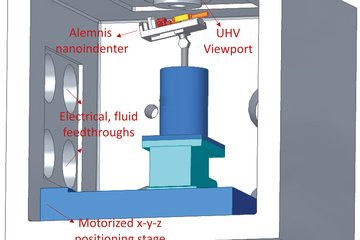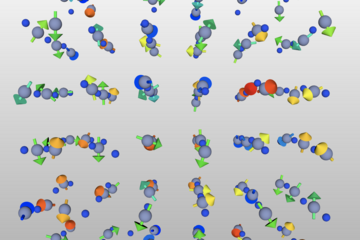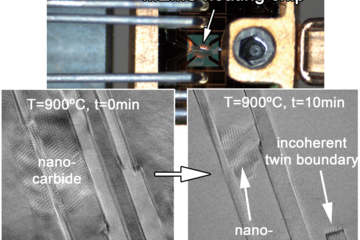All genres
1281.
Talk
Theory-guided design of Ti-binaries for human implants. XVI. International Materials Research Congress, Cancun (Merrida), Mexico (2007)
1282.
Talk
Nonlinear Elastic Effects in Group III-Nitrides: From ab-initio to Finite Element Calculation. 17th International Conference on Computer Methods in Mechanics CMM-2007, Spala, Poland (2007)
1283.
Talk
Nonlinear Elastic Effects in Group III-Nitrides: From ab-initio to Finite Element Calculation. 17th International Conference on Computer Methods in Mechanics CMM-2007, Spala, Poland (2007)
1284.
Talk
Thermodynamic versus Kinetic Stabilization of Short and Long-Range Order in Nitride Based Alloys. Multiscale approach to alloys: advances and challenges, Sigtuna, Sweden (2007)
1285.
Talk
Ab initio Determination of Thermodynamic Quantities: Status and Perspectives. The first Sino-German Symposium on Computational Thermodynamics and Kinetics and their Applications to Solidification, Changsha, China (2007)
1286.
Talk
Determination of symmetry-reduced structures by a soft-phonon analysis in magnetic shape memory alloys. Physics Seminar of Loughborough University, Loughborough, UK (2007)
1287.
Talk
Computer assisted design of metastable alloys. Leibniz-Institut für Festkörper und Werkstoffforschung International Workshop, Dresden, Germany (2007)
1288.
Talk
Application of the 8-band k.p-formalism to semiconductor nanostructures. Forschergruppentreffen Uni Bremen, Bremen, Germany (2007)
1289.
Talk
Ab initio based growth simulations of group-III-nitrides. Fifth International Conference on Solid State Crystals & Eight Polish Conference on Crystal Growth, Zakopane, Poland (2007)
1290.
Talk
Department of Computational Materials Design: Present activities and future research. Guided tour in the MPIE of IMPRS-SurMat, Duesseldorf, Germany (2007)
1291.
Talk
Ab initio prediction of elastic and thermodynamic properties of metals. Seminar in Friedrich-Alexander-Universitaet, Erlangen-Nürnberg, Germany (2007)
1292.
Talk
In-N anti-correlation in InGaAsN alloys: The delicate interplay between adatom thermodynamics and kinetics. Spring meeting of the German Physical Society (DPG), Regensburg, Germany (2007)
1293.
Talk
Theory-guided design of Ti-based binaries for human implants. Spring meeting of the German Physical Society (DPG), Regensburg, Germany (2007)
1294.
Talk
Ab initio calculation of free energies and thermodynamic properties of fcc metals. Spring meeting of the German Physical Society (DPG), Regensburg, Germany (2007)
1295.
Talk
Why are pi-helices so seldomly observed in proteins. Spring meeting of the German Physical Society (DPG), Regensburg, Germany (2007)
1296.
Talk
Ab initio study of the carbon-carbon interaction in iron. Spring meeting of the German Physical Society (DPG), Regensburg, Germany (2007)
1297.
Talk
Ab-initio based multiscale analysis of the 5D configurational space of Grain Boundaries in Aluminum. Spring meeting of the German Physical Society (DPG), Regensburg, Germany (2007)
1298.
Talk
Implementation and application of the k.p-formalism to electronic structure and Coulomb matrix elements. Spring meeting of the German Physical Society (DPG), Regensburg, Germany (2007)
1299.
Talk
Nonlinear Elastic Effects in Group III-Nitrides. Spring meeting of the German Physical Society (DPG), Regensburg, Germany (2007)
1300.
Talk
Band gap and band parameters of InN from quasiparticle energy calculations based on exact-exchange density-functional theory. Spring meeting of the German Physical Society (DPG), Regensburg, Germany (2007)











